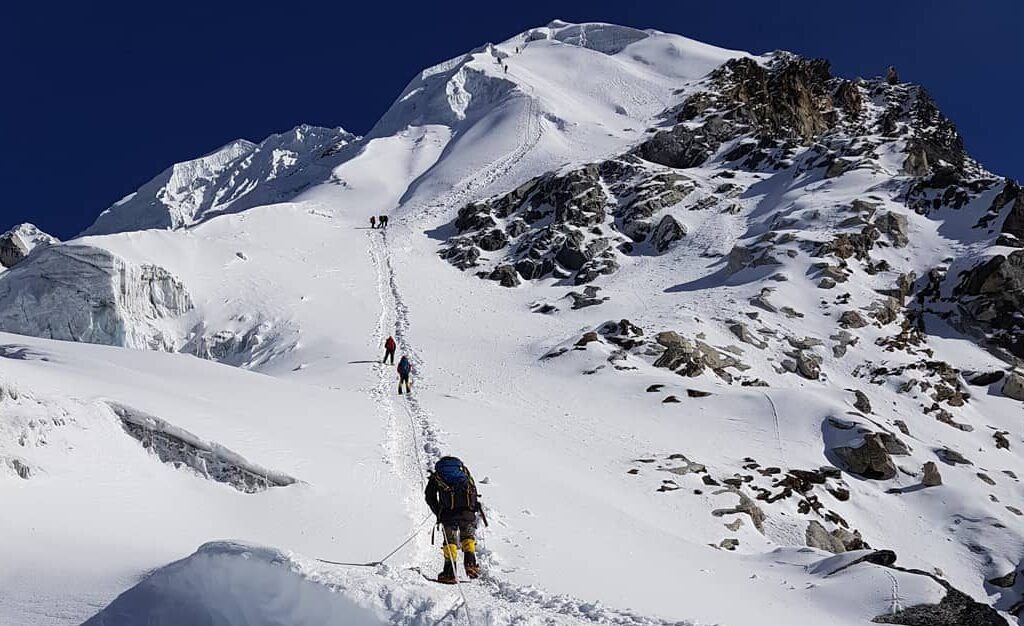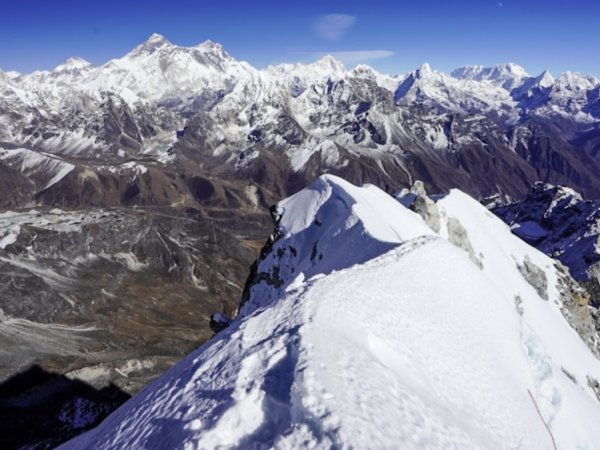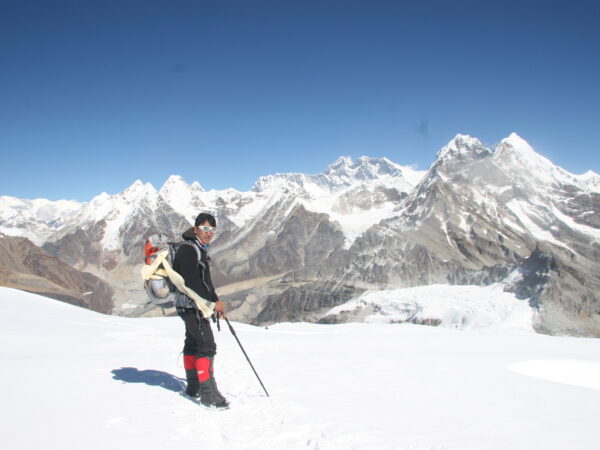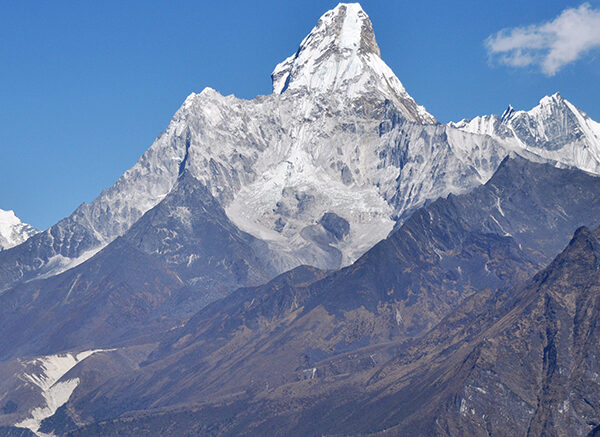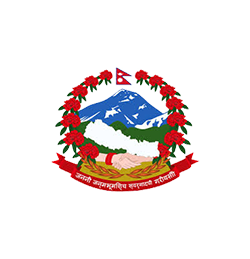Why us?
- Expertise & Experience
- Personalized & Flexible Itineraries
- Local Native Guides
- Competitive Pricing Without Compromising Quality
- Guaranteed Departure
- Top-notch Service
- Hassle-Free Permits & Logistics
- Small Groups for a Better Experience
- Safety First Approach
- Eco-Friendly & Sustainable Travel
- Exceptional Customer Service
- Community Support & Ethical Tourism
Highlights
- Enjoy and explore the beauty of Sagarmatha National Park, Local Sherpa culture, lifestyle and visit some impressive monasteries
- Explore Everest Base Camp (5364 m) and hike to Kalapathar (5545 m)
- Summit the Lobuche Peak 6119 m and have the stunning views of Mt Everest alongside Lhotse, Pumori, Nuptse, etc high Himalayan mountains
Overview
The Lobuche Peak locates near the Khumbu Glacier consisting of two different summits – east and west with an altitude of 6119 m and 6145 m respectively. Lobuche East Peak is considered a trekking peak while Lobuche West is an expedition peak.
By reaching at the summit of Lobuche Peak, you will have stunning panoramic mountain views of the Everest region. Even the Tibetan side’s Rongbuck is visible from the top of the peak.
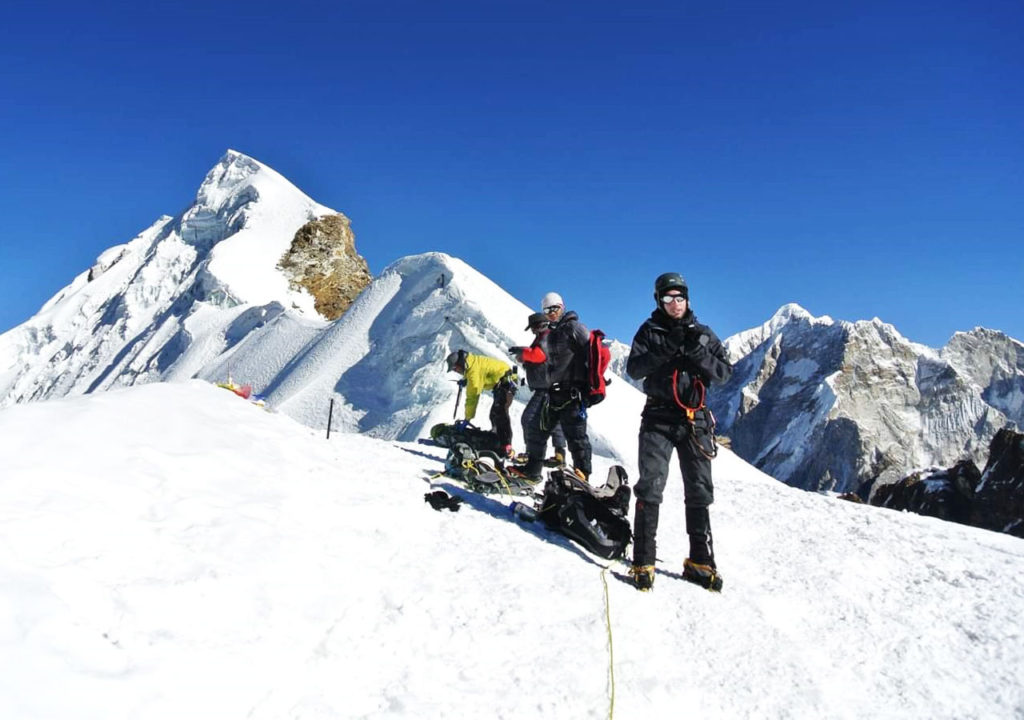
Important Information about Lobuche Peak Climbing
Lobuche East Peak is the second most prominent peak after Island Peak to pierce the mountaineering adventure in the Himalayas. However, it requires good climbing skills to attempt and you need to come with preparation to climb as it is a technically demanding trekking peak. The Lobuche Climb is a strenuous climb and should not be underestimated. You should have knowledge of using crampons and ropes which is important to be safe on the mountain.
Detailed Itinerary
Outline Itinerary
Day 1: Fly to Lukla (2,860m), trek to Phakding (2,610m) – 3-4 hrs
Day 2: Trek to Namche Bazaar (3,440m) – 6-7 hrs
Day 3: Acclimatization day (Hike to Everest View Hotel) – 3-4 hrs
Day 4: Trek to Tengboche (3,860m) – 5-6 hrs
Day 5: Trek to Dingboche (4,410m) – 5-6 hrs
Day 6: Trek to Lobuche (4,940m) – 5-6 hrs
Day 7: Trek to Everest Base Camp (5,364m) – 7-8 hrs
Day 8: Hike to Kalapathar (5,545m) and back – 6-7 hrs
Day 9: Trek to Lobuche High Camp (5,400m) – 4-5 hrs
Day 10: Climb Lobuche Peak Summit (6,119m) – 8-10 hrs
Day 11: Reserve day – Flexible
Day 12: Descend to Pangboche (3,930m) – 5-6 hrs
Day 13: Descend to Namche Bazaar (3,440m) – 6-7 hrs
Day 14: Descend to Lukla (2,860m) – 7-8 hrs
Day 15: Fly back to Kathmandu – 30-45 min
Trek Outline
The trip follows the traditional Everest trail and leads you to the Everest Base Camp 5364 m and Kalapathar 5545 m which will help you to gear up for Lobuche Peak Climbing with a stop at Gorakshep village. The village lies close to Everest Base Camp having an alpine climate. Here your body will get the opportunity to acclimatize in the thin air as altitude sickness is something an adventurer always tries to avoid while trekking and climbing the mountain.
In between the trail, you will spend an overnight at Phakding, Namche, Tengboche, Dingboche, Lobuche, and Gorakshep, while you retrace the same path to come back to Kathmandu. Before heading toward Tengboche, you will spend your 2 nights in Namche Bazaar in order to acclimatize your body to the high altitude.
After reaching Kalapathar and capturing memorable pictures of the high mountain range, you then descend down to Lobuche for the attempt of climbing Lobuche Peak.
Lodging and Fooding
One and only option for lodging and flooding in Everest is a tea house where you can get accommodation along with meals.
Most of the tea houses provide twin-shared accommodation, but you occasionally need to adjust to a dormitory in Gorakshep village in case of an overflow of trekkers. Because there are only 4 houses, and they may not afford the pressure of tourists sometimes in the best season.
Talking about the food, if you book the trip through an agency, they will provide 3 times meals per day. The limited menu option will be available to choose from. You can taste Nepali foods, Indian continental as well as continental cuisines.
Lobuche Peak Climbing Difficulty
Lobuche is a semi-technical peak. So, to attempt the Lobuche climb, one should come with preparation and should have good knowledge of mountaineering. The fitness level of the climbers should be excellent. For more detail, feel free to contact us.
Can I see Mt Everest from the Lobuche summit?
Yes, you can see! Unlike Island Peak, you can see the superb scenery of Mt Everest from the top of Lobuche Peak alongside Pumori, Cho Oyu, Lhotse, and Nuptse Peak.
Best time to climb Lobuche Peak
Since Lobuche Peak lies in the Everest region, its environment is the same as the Classic Everest Base Camp Trek route. Spring (March to May) and Autumn (September to November) are the best seasons to climb the peak whereas you are free to climb the peak at any time. But you need to know the basic weather and climate of Nepal before you plan to travel to Nepal.
Autumn (September – November): Clear skies, comfortable temperatures, and lush green valleys after the monsoon make this the most popular season.
Spring (March – May): Warm and dry weather with blooming rhododendrons adding scenic beauty to the trails.
Summer (June – August): Monsoon rains make trails muddy and prone to landslides, but regions like Mustang and Dolpo, which lie in the rain shadow, remain accessible.
Winter (December – February): Dry weather with cold nights, especially at higher altitudes, but offers quieter trails and stunning clear skies.
Physical Fitness for Trekking in Nepal
If you’re planning a trek in Nepal, your fitness level should match the demands of the trail. Moderate treks like the Everest Base Camp Trek require walking 7-8 hours per day at elevations up to 5,500 meters. The trails feature steep ascents, descents, and varied terrain, including rocky paths, well-trodden trails, and occasional snowy patches.
To prepare, start training at least four months before your trip. Incorporate aerobic exercises (running, swimming, cycling) and strength training to build endurance. Hiking with a loaded daypack similar to what you’ll carry on the trek is an excellent way to prepare. Focus on stamina over speed to ensure a safe and enjoyable trekking experience.
Typical Trekking Day
A standard trekking day starts early:
- 6:00 AM: Morning tea, packing up gear
- 8:00 AM: Start trekking
- 11:30 AM: Lunch break
- 3:00-4:00 PM: Arrival at teahouse or campsite, followed by free time
- 7:00 PM: Dinner, relaxation, and preparation for the next day
Shorter afternoon sessions allow for side excursions, photography, or rest before settling in for the night.
Meals & Accommodation on the Trek
Accommodation is typically in teahouses—family-run lodges offering food and shelter. Rooms are basic but comfortable, with communal bathrooms and electricity for charging devices.
Meals include a mix of Nepali and Western dishes, such as:
- Dal Bhat (lentil soup, rice, and curry) – unlimited refills!
- Pasta, pancakes, burgers, and soups
- Local specialties unique to the region
Dining areas are heated with a central stove, providing a cozy atmosphere after a long trekking day.
Managing Internal Flight Delays in Nepal
Flights to Lukla (Everest Region) are often delayed due to unpredictable weather. To avoid disruptions:
- Allocate extra buffer days before and after your trek.
- Consider helicopter alternatives ($350 – $650 per person, depending on group size).
- Ensure your travel insurance covers flight delays and alternative transport.
Travel Insurance for Trekking
Travel insurance is highly recommended. Your policy should cover:
- Trip cancellations and delays
- Medical emergencies (including high-altitude evacuation)
- Lost or stolen baggage
- Helicopter rescues (common in remote areas)
Confirm that your policy covers trekking up to your planned altitude level.
Nepal Visa Entry Procedure
Most travelers need a visa on arrival, available at Tribhuvan International Airport (TIA) and land borders.
Visa Fees:
- 15-day single entry: $30
- 30-day single entry: $50
- 90-day multiple entry: $125
Your passport must be valid for at least six months beyond your entry date. Bring USD in cash and passport photos for hassle-free processing.
For updated regulations, visit the Nepal Department of Immigration website.
Acute Mountain Sickness (AMS) & Prevention
Acute Mountain Sickness (AMS) can occur at altitudes above 3,000 meters. Symptoms include headache, nausea, dizziness, and shortness of breath.
To prevent AMS:
- Follow a gradual acclimatization schedule.
- Stay hydrated and avoid alcohol.
- Ascend slowly and take rest days at key altitudes.
- If symptoms worsen, descend immediately.
Our guides carry satellite phones for emergency communication and ensure your safety at all times.
Drinking Water Safety
Unsafe drinking water can cause health issues, so always purify your water:
- Avoid tap water (even for brushing teeth).
- Buy sealed bottled water.
- Use water purification tablets, filters, or UV sterilizers as eco-friendly alternatives.
- Boiled water is often available at teahouses—ask your guide for the best option.
Arrival Instructions
Upon arrival at Tribhuvan International Airport (TIA), our Everest Hikes representatives will greet you with a sign bearing your name. They will assist with luggage and transportation to your hotel in Kathmandu. Avoid unofficial porters and keep your belongings secure.
For a safe and unforgettable adventure in Nepal, Everest Hikes offers expert guides, well-planned itineraries, and seamless logistics. Contact us today to plan your dream trek!
Outline Itinerary
Day 01: Fly to Lukla (2,860m), trek to Phakding (2,610m) – 3-4 hrs
Day 02: Trek to Namche Bazaar (3,440m) – 6-7 hrs
Day 03: Acclimatization day (Hike to Everest View Hotel) – 3-4 hrs
Day 04: Trek to Tengboche (3,860m) – 5-6 hrs
Day 05: Trek to Dingboche (4,410m) – 5-6 hrs
Day 06: Trek to Lobuche (4,940m) – 5-6 hrs
Day 07: Trek to Everest Base Camp (5,364m) – 7-8 hrs
Day 08: Hike to Kalapathar (5,545m) and back – 6-7 hrs
Day 09: Trek to Lobuche High Camp (5,400m) – 4-5 hrs
Day 10: Climb Lobuche Peak Summit (6,119m) – 8-10 hrs
Day 11: Reserve day – Flexible
Day 12: Descend to Pangboche (3,930m) – 5-6 hrs
Day 13: Descend to Namche Bazaar (3,440m) – 6-7 hrs
Day 14: Descend to Lukla (2,860m) – 7-8 hrs
Day 15: Fly back to Kathmandu – 30-45 min
Lobuche Peak Climbing – 15 Days - Itinerary
Fly to Lukla (2,860m), trek to Phakding (2,610m) – 3-4 hrs
Your journey begins with a scenic mountain flight to Lukla, offering breathtaking views of the Himalayas. A short trek follows, leading you to Phakding, where you’ll walk alongside the Dudh Koshi River and pass charming Sherpa villages.
Trek to Namche Bazaar (3,440m) – 6-7 hrs
Crossing thrilling suspension bridges, passing picturesque villages, and entering Sagarmatha National Park, you’ll ascend to Namche Bazaar, the bustling gateway to Everest. Enjoy your first views of Everest on this rewarding trek.
Acclimatization day (Hike to Everest View Hotel) – 3-4 hrs
A short but scenic hike to Everest View Hotel helps with acclimatization while offering stunning panoramas of Everest, Lhotse, and Ama Dablam. Spend the rest of the day exploring Namche.
Trek to Tengboche (3,860m) – 5-6 hrs
Trek through pine forests and rhododendron-clad trails to reach Tengboche, home to the famous Tengboche Monastery. Witness breathtaking sunset views over Ama Dablam, Everest, and Lhotse.
Trek to Dingboche (4,410m) – 5-6 hrs
As you gain altitude, the landscape transforms into a high-altitude desert. You’ll pass Pangboche, the highest permanent Sherpa settlement, before reaching Dingboche, surrounded by Himalayan giants.
Trek to Lobuche (4,940m) – 5-6 hrs
A challenging yet rewarding trek leads to Lobuche, passing memorials for fallen climbers. You’ll trek along the Khumbu Glacier with spectacular mountain views.
Trek to Everest Base Camp (5,364m) – 7-8 hrs
The highlight of your trek—Everest Base Camp! Walk alongside the majestic Khumbu Glacier, soaking in unforgettable views of Everest, Nuptse, and Pumori. After celebrating your achievement, return to Gorak Shep for the night.
Hike to Kalapathar (5,545m) and back – 6-7 hrs
For the best sunrise view of Everest, an early morning hike to Kala Patthar is a must. From this vantage point, Everest appears closer than ever!
Trek to Lobuche High Camp (5,400m) – 4-5 hrs
Leave the EBC trail behind and ascend toward Lobuche High Camp. The climb offers stunning glacier views, preparing you for the final ascent.
Climb Lobuche Peak Summit (6,119m) – 8-10 hrs
Summit Day! A predawn start leads you up snowy ridges and technical sections, ultimately standing at the top of Lobuche Peak. From the summit, breathtaking 360° views of Everest, Lhotse, Makalu, and more await. After the climb, descend back to High Camp.
Reserve day – Flexible
This extra day ensures flexibility in case of weather delays or acclimatization needs.
Descend to Pangboche (3,930m) – 5-6 hrs
Begin your descent, passing through Pheriche and reaching Pangboche, home to one of the oldest monasteries in the Khumbu region.
Descend to Namche Bazaar (3,440m) – 6-7 hrs
Retrace your steps back to Namche Bazaar, where you can enjoy a hot shower, great food, and a well-earned rest.
Descend to Lukla (2,860m) – 7-8 hrs
A long but rewarding trek back to Lukla, where you’ll celebrate your successful climb with your team.
Fly back to Kathmandu – 30-45 min
A scenic morning flight back to Kathmandu marks the end of your unforgettable Himalayan adventure.
Inclusions
What's included
- International Airport pick up and drop by private vehicle
- 3 Star hotel accommodation in Kathmandu 2 Night (Bed and breakfast included)
- Tea house accommodation (twin-shared basis) in the trek
- Meals (Breakfast, Lunch, and Dinner) 3Time Tea coffee during the trek
- Kathmandu to Lukla flight Ticket ( Round trip)
- A professional sherpa climbing guide
- A professional trekking guide And porter
- A porter (carry up to 20 kg ) - 1 porter for every 2 trekkers
- Meals, Accommodation, Travel Insurance etc for all our staffs during the trek
- All required permits (Climbing Permit, TIMS, Local Government Taxes, Sagarmatha National Park Permits)
- Tented camp while on Lobuche Peak Climbing.
- All necessary camping equipment , Tent, Table & Chair for climbing expedition's crew's.
- Lobuche peak Climbing group climbing gear, climbing rope, snow bars & carabineers etc.
- Basic medical kits
- A trekking map
- A duffel bag to carry all your belongings (should be returned after the trek)
- Rescue arrangement only (must be covered by your travel insurance)
- All Government taxes and official expenses
- Farewell dinner
- Everest Hikes T-shirt
What's not included
- International Airfare.
- Your Travel Insurance.
- Rescue & Evacuation.
- Nepal Visa fee (mostly on arrival).
- Lunch and Dinner in Kathmandu.
- Tips for Guide, Porter and Driver
- Drinks and beverage - bottled water / hot water / alcohol.
- Chocolates and sweets.

